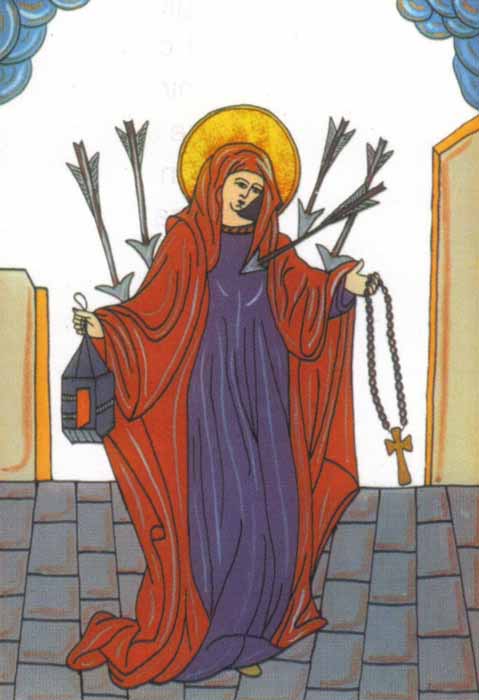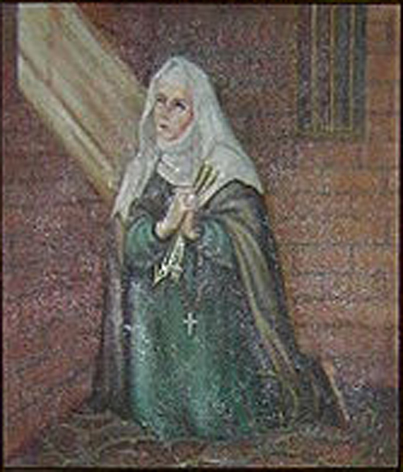Bienheureuse Dorothée de Montau
Mystique et recluse (✝ 1393)
Épouse d'un modeste ouvrier de Gdansk en Pologne, mère de neuf enfants, elle se retira du monde quand elle fut veuve, pour se consacrer à la prière. Elle se fit emmurer recluse tout contre la cathédrale de Marienwerder. Sa cellule avait trois fenêtres: l'une vers le ciel, la deuxième vers l'autel, la troisième vers le cimetière. Elle recevait beaucoup de visiteurs que sa charité spirituelle encourageait. Ses confesseurs ont rapporté, après sa mort, les communications célestes dont elle recevait les grâces.
À Marienwerder en Podolie polonaise, l’an 1394, la bienheureuse Dorothée de Montau, veuve, qui vécut recluse dans une cellule touchant la cathédrale, adonnée continuellement à la prière et à la pénitence.
Martyrologe romain
Dorothée de Montau
Religieuse bénédictine, Bienheureuse
1347-1394
La bienheureuse Dorothée naquit le 6 février 1347 à Montau, en Prusse (aujourd'hui en Pologne) sur la Vistule. Dès sa jeunesse, elle se mortifiait. Elle se maria à seize ans avec Adalbert, armurier de son état et plus âgé que la jeune femme.
Le ménage vivait fort chrétiennement, malgré les accès de colère passagers d'Adalbert. Ils s'installèrent à Dantzig, grand port de commerce de la Hanse. Dorothée donna naissance à neuf enfants. Seulement une fille atteint l'âge adulte. Elle devint bénédictine et sa mère lui dédia un traité de spiritualité.
À 31 ans, Dorothée connut ses premières extases, un état d'amour languissant pour son Seigneur. Son mari la désapprouva au début, puis ils décidèrent de faire des pèlerinages. Lors d'un pèlerinage à Rome — cette fois-ci sans Adalbert — celui-ci mourut. C'était en 1390.
Profondément émue, Dorothée se rendit à Marienwerder, où elle rencontra celui qui allait devenir son directeur spirituel : Jean de Marienwerder (1343 à 1417). Il avait été théologien à Prague et faisait partie de l'Ordre Teutonique. Sage et avisé, il commença à prendre note des visions de Dorothée et de son enseignement.
A partir de 1393, Dorothée décida de vivre en recluse dans une cellule attenante à la cathédrale. Elle communiait tous les matins, ce qui à l'époque était exceptionnel. Elle édifia de nombreux fidèles...
Elle s'inspirait aussi de sainte Brigitte, dont les reliques avaient voyagé à Dantzig, lorsque Dorothée y vivait. Elle se sentait proche de la spiritualité dominicaine.
Grâce à son confesseur, elle put éditer des traités spirituels et deux “vitae”. De nombreux écrits de Dorothée transcrivent ses visions, son amour de l'Eucharistie, son chemin de pénitence jusqu'à sa transformation dans le Saint-Esprit vers l'union mystique. Cette âme féminine et profondément aimante fait partie des grandes mystiques à redécouvrir !
Elle mourut à Marienweder le 25 juin 1394 et fut dès lors considérée comme l'une des patronnes de la Prusse.
SOURCE : http://ut-pupillam-oculi.over-blog.com/article-20752669.htmlDorothy of Montau, Widow (PC)
Born at Montau near Marienburg, Prussia, Germany, on February 6, 1347; died June 25, 1394. Though she was never canonized, Saint Dorothy is widely venerated in central Europe, particularly among the Prussians, who have selected her as their patron saint. Like Saint Catherine of Siena and Saint Bridget of Sweden, who were her contemporaries, she was favored by divine grace with many visions, revelations, and ecstasies, especially during the last years of her life.
As a 17-year-old peasant girl, she married a wealthy swordsmith from Danzig named Albert (Albrecht) by whom she had nine children. Of these only the youngest survived, a daughter who later became a Benedictine nun. Albert appears to have been surly and bad- tempered, and it seems likely that their married life, at least in its early years, was far from ideal. However, Dorothy's gentleness, fortitude, and kindness gradually softened him, and in 1384, he agreed to accompany her on a pilgrimage to Aachen.
After other pilgrimages to Einsiedeln and Cologne, they planned to make one to Rome for the jubilee that was to be held in 1390; but while they were making their preparations, Albert fell ill and so Dorothy went alone, travelling on foot and begging her food. By the time she returned from Rome, where she had been delayed by a sickness, her husband had died.
Now that she had become a widow, Dorothy was able to fulfill a dream she had long cherished of retiring from the world. In 1391, she went to Marienwerder where, after spending two years on probation, she became a recluse in the church of the Teutonic Knights.
On May 2, 1393, she had herself walled up in a cell that measured 6' x 6' and was about 9' tall. Of the three windows one opened to the sky, the second to a cemetery (and through which she also received food) and the third on to the altar of the church where, as was often the custom in those regions, the Blessed Sacrament was exposed all day.
Like many others, Dorothy had an intense devotion to the Blessed Sacrament and was often favored with mystic visions of it. Her reputation for holiness grew rapidly and many people came to her seeking counsel or miraculous cures.
However, the rigors of her mode of life, added to the severe austerities she practiced, soon broke her health and she died in May 1394, after living only a little more than a year in her cell. Many miracles were attributed to her, and an account of her visions and ecstasies has been left by her confessor (Benedictines, Delaney, Encyclopedia).
Dorothy's emblem is a lantern and a rosary. Sometimes she is surrounded by arrows in paintings of her. Venerated at Montau and Marienwerder, Prussia (Roeder).
SOURCE : http://www.saintpatrickdc.org/ss/1030.shtml
Blessed Dorothy of Montau
ST. DOROTHEA OF MONTAU, recluse, born at Montau, 6 February, 1347, d. at Marienwerder, 25 June, 1394. At the age of seventeen she marriedthe sword-cutler Albrecht of Danzig, a hot-tempered man, whose nature underwent a change through her humility and gentleness. Both made frequent pilgrimages to Cologne, Aachen, and Einsiedeln, and they intended (1390) to visit Rome also; but Albrecht was prevented by illness and remained at home where he died, while Dorothea journeyed to Rome alone. Of their nine children all died, except one daughter who joined the Benedictines. In the summer of 1391 Dorothea moved to Marienwerder, and on 2 May, 1393, with the permission of the chapterand of the Teutonic Order, established a hermitage near the cathedral. She led a very austere life. Numerous visitors sought her advice and consolation, and she had wonderful visionsand revelations. Her confessor, the deaconJohn of Marienwerder, a learned theologian, wrote down her communications and composed a Latinbiography in seven books, "Septililium", besides a Germanlife in four books. She was never canonized, but the people honoured her as the guardianof the country of the Teutonic Knights and Patronessof Prussia." Her feast is celebrated on 25 June, in some places on 30 October. The church at Marienwerder is now in the hands of the Lutherans; her relics cannot be found.
Meier, Gabriel."St. Dorothea."The Catholic Encyclopedia.Vol. 5.New York: Robert Appleton Company,1909.31 Oct. 2015<http://www.newadvent.org/cathen/05135d.htm>.
Blessed Dorothy of Montau
Also known as
§ Dorota z Matowów
§ Dorothea of Montau
§ Dorothea Swartz
§ Dorothea von Montau
§ Dorthea von Montau
§ 25 June
Profile
Peasant, one of ninechildren. Married at age 17 to a wealthy swordsmith named Adalbert or Albrecht of Prague (in modern Czech Republic). Boreninechildren, only one of whom survived; the girl became a Benedictinenun. Difficultmarriage; she suffered abuse from her husband, but she encouraged him in his trade and his faith. Went on a pilgrimage to Rome, Italy in 1389, fell ill, and was forced to stay for many weeks, during which time her husband died at home. Widow. Nun at Marienwerser. Great devotion to the Blessed Sacrament; the absorption of the Eucharist “agitated her like boiling water; had she been allowed, she would willingly have torn the host from the priest‘s hands to bring it to her mouth….” Lived in a 6×9 foot cell. Visionary. Prophetess. Miracleworker.
Born
§ 6 February1347 at Groß Montau, Prussia, one of the states of the Teutonic Knights (modern Matowy Wielkie, Poland)
§ 25 January1394 at Marienwerder, Kwidzyn, Prussia (in modern Poland) of natural causes
§ lantern
§ rosary
§ brides
§ Prussia
§ widows


